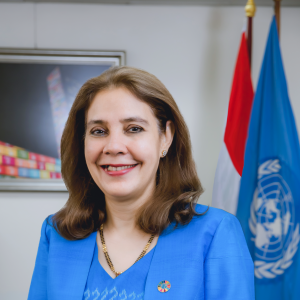I am delighted to welcome you all to this important briefing, which provides us with an excellent opportunity to address the challenges of cybercrime, which impacts our economies, communities and individuals.
I would like to thank John Wojcik for his work on this ground-breaking UNODC report, which will aid us in better understanding the complexities of cross-border organized crime with a focus on cyber fraud.
This issue is especially timely as earlier this month Indonesian authorities in Batam arrested a high-profile fugitive wanted for allegedly running a massive online gambling operation that exploited victims across borders.
The case is a reminder that cyber-enabled frauds often operate across jurisdictions with impunity and underscores the importance of transnational collaboration.
Indonesia plays a critical role in these partnerships.
The scale of cyber-enabled frauds in Southeast Asia is staggering.
Research indicates they cost between $18 billion and $37 billion annually.
In Indonesia alone the illegal online gambling sector is valued at over $20 billion and involves more than 3 million people.
Behind the statistics is the equally considerable human cost.
Thousands of Indonesians, for instance, have been lured abroad by online scammers with false promises of work, only to find themselves trapped in exploitative situations.
Cybercrime also has severe real-life consequences for the SDGs and Indonesia’s development trajectory by impacting trust, governance, and economic stability.
This is why it is vital to integrate policing of cybercrime into national development planning.
I am heartened by Indonesia’s leadership on this issue.
An example of this is the cross-ministry Online Gambling Eradication Task Force, which was set up earlier this year.
It is an excellent step forward as concerted action on cyber fraud is critical with criminal networks becoming increasingly sophisticated by using new technologies like artificial intelligence and cryptocurrency.
This is presenting evolving threats, which will necessitate building and leveraging all our partnerships.
At the UN, we are committed to supporting Indonesia’s efforts to clamp down on cybercrime through close collaboration with the government.
The report highlights several areas where we can focus our efforts.
One, we need to strengthen regulations on virtual asset service providers to curb cryptocurrency misuse.
Two, we need to build law enforcement capacity to tackle the use of artificial intelligence in criminal activities.
Three, we need to ensure that cybercrime mitigation is embedded in Indonesia’s development plans to support long-term resilience.
And four, we need to leverage enhanced cooperation across ASEAN to address cross-border challenges.
These priorities align with Indonesia’s aspirations for sustainable growth and security and the UN stands ready to support the government and its partners to make them a reality.
Today’s briefing will enable us to reflect on what we can do together to address challenges.
I would like to encourage you all to engage openly, ask questions, and share ideas as we hear from John and explore the findings of this key report.
Thank you.


